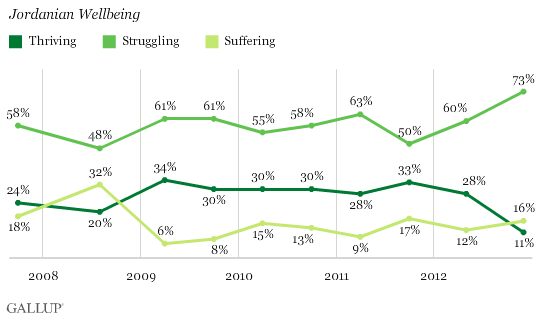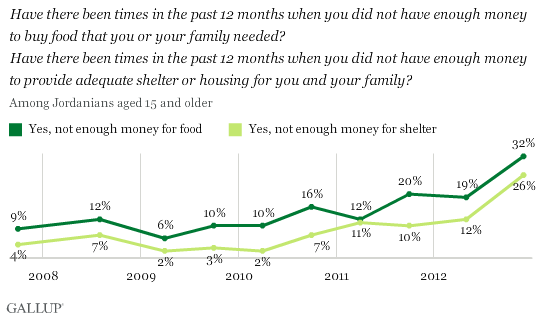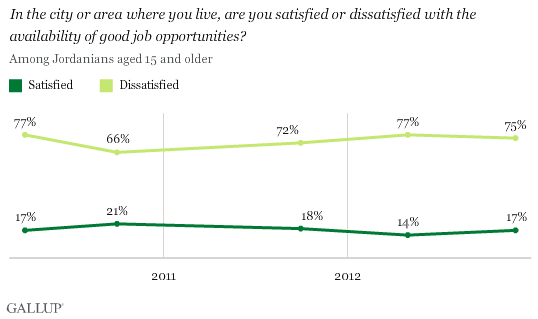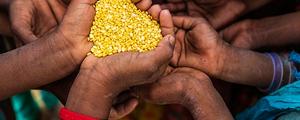WASHINGTON, D.C. -- Jordanians are expressing increasing pessimism. The percentage rating their lives highly enough to be considered "thriving" fell to an all-time low of 11% in December 2012. More now are so negative about their prospects that they are either "struggling" (73%) or "suffering" (16%).

Gallup classifies respondents as thriving, struggling, or suffering, according to how they rate their current and future lives on a ladder scale with steps numbered from zero to 10 based on the Cantril Self-Anchoring Striving Scale. Those who rate their present life a 7 or higher and their life in five years an 8 or higher are classified as thriving, while those who rate both dimensions a 4 or lower are considered suffering. Respondents whose ratings fall in between are considered struggling.
These data likely reflect the difficult economic conditions Jordanians face, a situation worsened by the influx of hundreds of thousands of refugees from neighboring Syria since that country's civil war began in 2011.
Jordanians' Ability to Afford Basics Declines, Views of Job Market Remain Negative
Jordanians are now more likely than ever to say there were times in the past 12 months when they did not have enough money to buy food, with 32% saying so in December. This is more than twice as high as it was between 2008 and 2010.
More Jordanians are also struggling to afford shelter, with 26% saying so in December, up from 10% in late 2011. Such perceptions are not likely to improve in the short term as Jordan saw a 7% inflation rate during the first five months of 2013.

The increase in the percentage of those struggling to afford basic needs is occurring in an economic environment already contending with chronic dissatisfaction with employment opportunities. More than seven in 10 adults in Jordan remain dissatisfied with the availability of good job opportunities in their city or local area.

Bottom Line
Jordanians' declining outlook on their own lives and ability to provide their family with basics suggest that inflation and unemployment in the country are beginning to take a toll on residents. Without major improvement in the country's economic environment, GDP growth made in the past few decades could be lost.
For complete data sets or custom research from the more than 150 countries Gallup continually surveys, please contact us.
Survey Methods
Results are based face-to-face interviews with approximately 1,000 adults in each survey, aged 15 and older, and conducted in October 2007, August 2008, April 2009, October 2009, April 2010, October 2010, April 2011, October 2011, May 2012, and December 2012 in Jordan. For results based on the total sample of national adults, one can say with 95% confidence that the maximum margin of sampling error is ±3.7 percentage points. In addition to sampling error, question wording and practical difficulties in conducting surveys can introduce error or bias into the findings of public opinion polls.
For more complete methodology and specific survey dates, please review Gallup's Country Data Set details.
